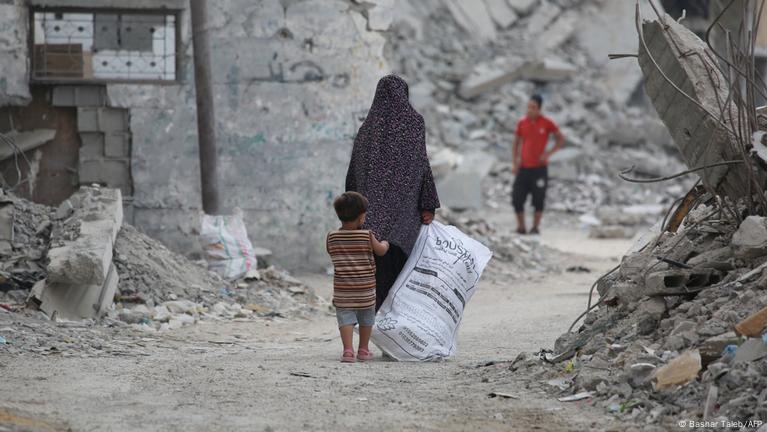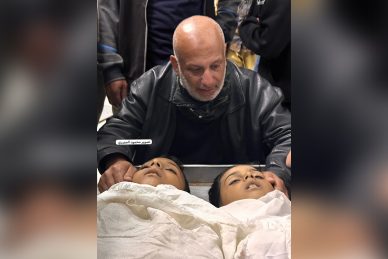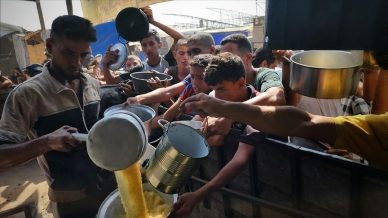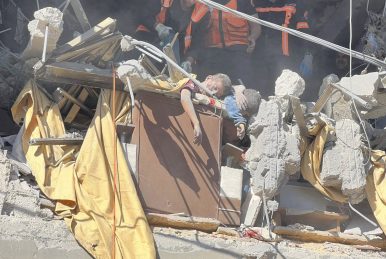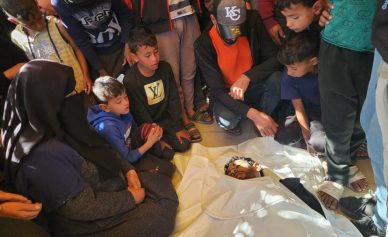GAZA, (PIC)
Amid tents and schools that shelter them after the destruction of their homes, Palestinian women in the Gaza Strip face harsh conditions. Some have lost their husbands, others have lost their children, and many suffer from injuries without access to necessary treatment.
On International Women’s Day, observed on March 8 each year to celebrate the achievements of women worldwide, it becomes a day in Gaza that reflects the suffering and pain endured by many women there.
Um Mohammed Mansour is one of those women who felt a sense of relief after the announcement of a ceasefire in Gaza on January 19. However, that relief was short-lived. The mother of four was shocked upon returning to her partially destroyed home, having lost all its contents.
Throughout a year and a half of displacement, this woman in her fifties has adjusted, like many other women, to the harsh living conditions in displacement camps in southern Gaza. She had to deal with smoke from burning wood to secure food for her family, but she never expected that cooking over firewood would become an essential part of her life.
“I was happy to return to my partially destroyed home, but I was shocked to find that most of my furniture and kitchen utensils, including the cooking gas, had been stolen. I expected to find the gas cylinder missing, but not the stove as well. Securing a new cylinder, even at a high price, is possible, but under these circumstances, it’s hard to afford a new stove with so many other obligations,” she says.
Mansour points out that her husband had a small shop before the war and now struggles to secure merchandise for its reopening, as traders demand cash or bank transfers for goods.
Returning to using firewood is not the only burden on Mansour and her family. The woman faces other life challenges, such as securing clean drinking water. They are asked to pay for the fuel needed to operate the water pump, forcing her children to carry water gallons daily to refill their tank manually.
High costs
Women, along with children, have paid a heavy price in the genocide against Gaza, collectively accounting for 70% of casualties, according to data published by the UN High Commissioner for Human Rights.
The Israeli army killed 12,316 Palestinian women, and 13,901 women became widows after losing their husbands and family providers. Additionally, 50,000 pregnant women gave birth under inhumane conditions, and 17,000 mothers mourned the loss of their children, while 162,000 women suffered from infectious diseases, and 2,000 women and girls will live with disabilities due to amputations, according to data published by the Government Media Office.
Noor Al-Dalu is one of the girls who survived death but did not escape deep wounds. She suffered severe injuries that changed the course of her life, leaving her with physical and psychological scars that may never heal. Each of them carries an endless pain after losing part of their body, their identity, and their ability to live as they once did. All of this occurs amid a systematic destruction of the health system due to the Israeli attack and a suffocating blockade that denies them the opportunity to receive necessary treatment.
The family home of Noor (18 years old) was hit by an Israeli missile, which resulted in the loss of her mother, sister, and niece, and she had both legs amputated. She says, “I was thrown ten meters from the force of the explosion, and when I woke up, I didn’t recognize my body. I couldn’t scream or cry; the pain was too great to turn into words.”
She adds in a testimony reported by the Palestinian Human Rights Center: “I can no longer walk, or move around, or live my life as I used to. My future is uncertain, with no home, no education, and no treatment. I spend long days burdened with thoughts of how the Israeli occupation has deprived me of living as a normal human being. How did it turn me, in an instant, into a person with a disability without a mother or sister?”
She continues: “It’s an indescribable feeling as I still wait for permission to travel for appropriate treatment and to get a prosthetic limb that would give me a chance to regain a part of what I lost.”
Lack of privacy
Meanwhile, Palestinian Um Ahmed Abu Ayada, who lives in a tent and prepares breakfast for her four children after her husband’s death, tells Anadolu: “My husband died of cancer during the war. There were no chemotherapy sessions available for his treatment, and we couldn’t afford the necessary care.”
She points out that she lives under difficult conditions due to the war, deprived of her basic needs, which has pushed her to start a small project to provide for her family.
Instead of celebrating International Women’s Day, the Palestinian woman spends her day fetching water and gathering firewood, as she states. She notes that she is far from her family in Egypt, who left for treatment, and there’s been no communication due to power and internet outages.
Women in displacement camps suffer from lack of privacy, living in tattered tents. They have to wear prayer garments all the time, even when going to the market.
Among them is the widow Wafa Rabi, who cares for five children. She says she used to wear the prayer garment only during prayer, but with so many men around her, she wears it all the time, even when sleeping. “Life in a tent is like living in the open air. We need a new tent to replace this one, which has deteriorated due to summer and winter weather.”
Rabi narrates how the closure of the borders affects the lives of women in Gaza. Since the occupation closed the Karem Abu Salem crossing on March 2, a day after the end of the first phase of the ceasefire agreement in Gaza, prices for many women’s necessities, such as sanitary pads and shampoos, have risen.
A sentence of slow death
The United Nations said that there are more than 690,000 women and girls in Gaza who need menstrual hygiene products, in addition to clean water and toilets.
The first phase of the ceasefire agreement ended last Saturday, while negotiations for the second phase were supposed to start on the 16th day of the first phase of the agreement (February 3).
The occupation government has reneged on the ceasefire agreement and prisoner exchange with Hamas, refusing to move to the second phase, as it seeks to extend the first phase of the exchange deal to release as many Israeli prisoners as possible without giving anything in return or completing the military and humanitarian obligations imposed in the agreement during the past period.
The Palestinian Human Rights Center called for intensified international efforts to ensure the continuation of the ceasefire in the Gaza Strip, achieving effective protection for women and all residents and limiting the catastrophic repercussions of the genocide targeting them.
It emphasizes the necessity of allowing humanitarian aid without restrictions, indicating that the continued prevention of its arrival in Gaza deepens the humanitarian disaster and entrenches the suffering of women, who are deprived of the most basic elements of life, including temporary housing (caravans) that provide them with a minimum of safety and comfort, in addition to basic needs such as food, water, fuel, and health supplies, to meet their vital needs under current conditions.
It stresses the urgent and unconditional opening of the crossings leading to the Gaza Strip to save the lives of injured women and ensure they receive urgent and appropriate treatment outside the Strip, noting that the continued closure of the crossings amounts to a deliberate crime exacerbating the suffering of the injured and condemning them to a slow death.
The Palestinian Human Rights Center calls for intensified national and international efforts to expedite the reconstruction of the Gaza Strip without delay, aiming to address the catastrophic effects of the genocide that targeted its inhabitants.
It highlights the importance of paying special attention to women who bear the burdens of this disaster by adopting comprehensive psychological and social support programs to treat the psychological trauma they suffer due to the genocide.
Furthermore, the Palestinian Human Rights Center urges the enhancement of economic empowerment programs to ensure the restoration of normal life and achieve justice for the victims, as well as ensuring the effective political representation and participation of women in determining recovery and development priorities.
The Center emphasizes the necessity for the international community to adhere to the provisions of international criminal law and principles of international justice and to take decisive action to hold Israel, its leaders, and those responsible for serious international crimes against the Palestinian people accountable before international courts.

